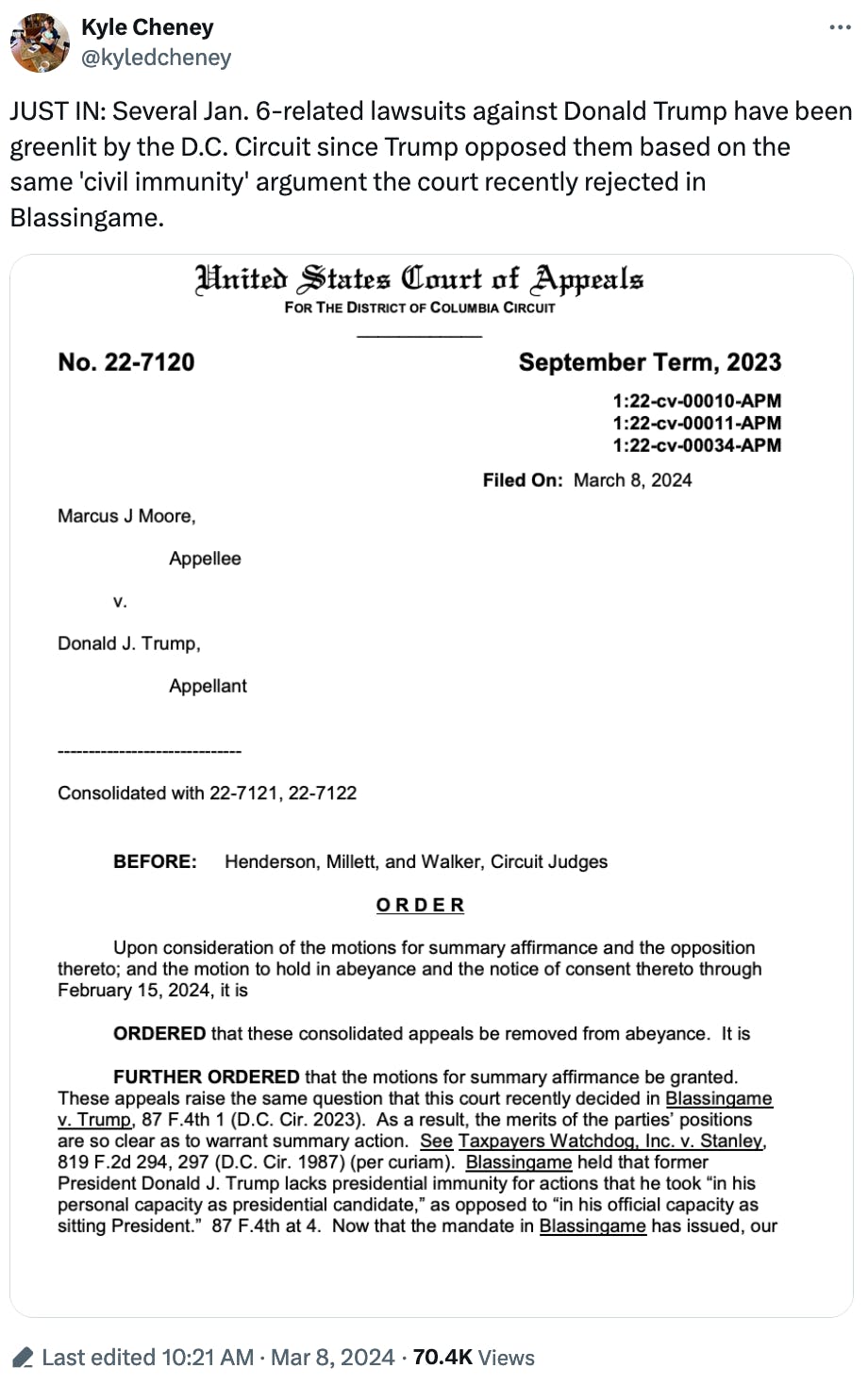Trump Is About to Face an Avalanche of January 6 Lawsuits
Donald Trump’s legal woes continue to grow, as three more lawsuits against him were greenlit on Friday to proceed.The U.S. Court of Appeals in Washington, D.C., has approved three lawsuits related to Trump’s role in the January 6 attack. One of the suits, Moore v. Trump, was brought by Capitol Police Officer Marcus Moore. Moore, who has been on the force for more than 10 years, accused Trump of inflicting “physical and emotional injuries” on him via his actions surrounding the insurrection.The appellate court order listed Moore’s case and the case numbers for two other lawsuits. “These appeals raise the same question that this court recently decided in Blassingame,” the three-judge panel wrote, referring to the ruling that Trump does not have presidential immunity from prosecution.“As a result, the merits of the parties’ positions are so clear as to warrant summary action,” the judges said, meaning they can make a decision without releasing a legal opinion.Trump has already lost two major cases via summary order. The first was E. Jean Carroll’s second lawsuit against him for defamation. The presiding judge determined that since Trump had already been found liable for sexually abusing Carroll and defaming her while denying it, his other comments about her were by default defamatory.The second was when a judge ruled that there was sufficient evidence to prove Trump had committed real estate–related fraud in New York. A trial was only necessary to set damages, not to prove whether the allegations against him were true.The D.C. appeals court ruled in early February that Trump does not have “presidential immunity.”“For the purpose of this criminal case, former President Trump has become citizen Trump, with all of the defenses of any other criminal defendant. But any executive immunity that may have protected him while he served as President no longer protects him against this prosecution,” the judges said in the ruling.That ruling, however, could soon be overturned. The Supreme Court agreed to hear Trump’s appeal on immunity. The justices will hear arguments on April 25.

Donald Trump’s legal woes continue to grow, as three more lawsuits against him were greenlit on Friday to proceed.
The U.S. Court of Appeals in Washington, D.C., has approved three lawsuits related to Trump’s role in the January 6 attack. One of the suits, Moore v. Trump, was brought by Capitol Police Officer Marcus Moore. Moore, who has been on the force for more than 10 years, accused Trump of inflicting “physical and emotional injuries” on him via his actions surrounding the insurrection.
The appellate court order listed Moore’s case and the case numbers for two other lawsuits. “These appeals raise the same question that this court recently decided in Blassingame,” the three-judge panel wrote, referring to the ruling that Trump does not have presidential immunity from prosecution.
“As a result, the merits of the parties’ positions are so clear as to warrant summary action,” the judges said, meaning they can make a decision without releasing a legal opinion.
Trump has already lost two major cases via summary order. The first was E. Jean Carroll’s second lawsuit against him for defamation. The presiding judge determined that since Trump had already been found liable for sexually abusing Carroll and defaming her while denying it, his other comments about her were by default defamatory.
The second was when a judge ruled that there was sufficient evidence to prove Trump had committed real estate–related fraud in New York. A trial was only necessary to set damages, not to prove whether the allegations against him were true.
The D.C. appeals court ruled in early February that Trump does not have “presidential immunity.”
“For the purpose of this criminal case, former President Trump has become citizen Trump, with all of the defenses of any other criminal defendant. But any executive immunity that may have protected him while he served as President no longer protects him against this prosecution,” the judges said in the ruling.
That ruling, however, could soon be overturned. The Supreme Court agreed to hear Trump’s appeal on immunity. The justices will hear arguments on April 25.



